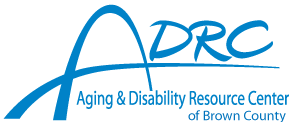Youth Transition from High School
Transition – A New Beginning
Transitioning from school to adulthood should be an exciting time, but can often be overwhelming, confusing, and uncertain, especially for adults with disabilities. You need someone that can help you navigate all of your options, making sure you have all of the necessary services in place to make this next adventure in your life successful!
We are here to help.
- Are you 17 years & 6 months old, looking for one place to go for information and assistance?
- Graduating from high school, but not sure which step to take next?
- Considering continuing your education?
- Need a little help finding a job?
- Looking to move out of your parent’s home, but not sure if you’re ready?
You are not alone! These are common questions when transitioning from high school to adulthood. ADRC of Brown County can help you and your loved ones every step of the way. Here’s how:
- Information & Assistance Specialists: These trained staff will listen to your story, hear what goals you have set for yourself (or even help you set up goals), and guide you in finding the resources in the community that will work best for you. Our staff give you all the options so that YOU can make all of the decisions.
- Benefit Specialists: Provide information about eligibility for appropriate benefits and explain how to apply. If you need help advocating for yourself or feel you have been incorrectly denied for benefits, they can help.
Let’s get started! Call ADRC at (920) 448-4300. We can help by phone, in our office at 300 S. Adams, Downtown Green Bay, or make an appointment to come to your home.
Partnering with Professionals
Are you a professional looking to make a referral to ADRC?
Topics ADRC can discuss:
- Discussion of rights and responsibilities when turning eighteen
- Continuing education or employment
- Housing and Transportation options
- Information on legal issues such as guardianship, power of attorney, and estate planning
- Access to adult long term care programs
- Information on applying for SSI and other public benefits including health care
For those under 17 years & 6 months
Brown County Children’s Long-Term Support office can assist.
Call (920) 448-7884.
Brown County Community on Transition (CCoT)
Mission: Brown County Community on Transition involves planning for life after high school. It is a cooperative process between parents, students, and teachers with help from other agencies as needed. Formal transition planning should commence by the time a special education student turns 14. It should support a student’s goals for living, learning, and working after they finish high school.
Meetings: Meetings are currently being held virtually on the second Thursday of each month.
For more information about CCoT and to get connected to this group, please contact ADRC at (920) 448-4300.
Youth Transition from High School
ADRC Youth Transition Referral Form
For use by professionals to refer high school students age 17 years 6 months to ADRC.
Youth Transition Guide
A guide for young adults with disabilities and those who support them to help understand decisions that need to be made during there transition from childhood to adulthood. Includes listings of resources and checklists to start planning.
WI FACETS is Wisconsin Family Assistance Center for Education, Training, & Support
Website full of information for parents and others who care for and support children with disabilities.
Opening Doors to Self-Determination
Booklet for help in planning life after high school for students, school counselors, teachers, and parents/guardians. Produced by the State of Wisconsin Department of Instruction.
Opening Doors to Postsecondary Education and Training
Booklet to help in planning for Education and Training after high school for students, school counselors, teachers, and parents/guardians. Produced by the State of Wisconsin Department of Instruction.
Opening Doors to Employment
Booklet to help in planning for employment after high school for students, school counselors, teachers, and parents/guardians. Produced by the State of Wisconsin Department of Instruction.

